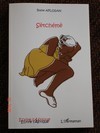| Most Nigerians are too young to remember the devastating civil war that ripped their country apart more than four decades ago. But for world-famous author and scholar Chinua Achebe, 81, the Biafran War of 1967-1970 is more than a moment in history. It is a lesson that should not be forgotten, especially as Nigeria witnesses a new wave of sectarian violence that threatens to split Africa's most populous nation again. Achebe’s new memoir, “There Was a Country,” was published in the United Kingdom on Thursday. It will hit the shelves in Nigeria any day now, and will be available in the United States on Oct. 11. It tells the story of Achebe’s experiences in the Nigerian Civil War, when he served as a diplomat representing the would-be breakaway republic called Biafra. Achebe is most famous for his 1958 novel, “Things Fall Apart,” which won him international acclaim. He now makes his home in Rhode Island, where he is a professor at Brown University. But with his new memoir, he hopes to remind his countrymen of a conflict not so dissimilar from the one that threatens to erupt in Nigeria today. | The price of such a clash could be horrific, just as it was during the days of Biafra’s attempted secession. In total, up to 3 million people -- most of whom were civilians -- lost their lives during less than three years of civil war. A Forgotten Story As often happened during the era of African colonialism, the British carved out the territory of Nigeria with little regard for ethnic, linguistic and cultural variations. When the country gained independence in 1960, the differences between the different regions of Nigeria were stark. Most northern Nigerians followed Islam, whereas Christianity had taken root more easily in southern regions. |
« Comment Kérékou Travaille dans l’Ombre pour Faire Élire | Accueil | Croisière en Yayiland : Aller en Fanfare, Retour sans Fard »
29 septembre 2012
L'utilisation des commentaires est désactivée pour cette note.
Les notes récentes
- Pour un Bénin Intègre, Dynamique et Juste : JaY 2016!
- Front Pour la Responsabilisation des Acteurs Publics: JYPPE 2016
- Bénin : Portrait Robot du Président en 2016
- 3 juil 2015 13:59:58
- France : A chacun son Egungun
- Tweet du Jour : Si « Institutions Complices » Veut dire Instrumentalisation, Alors c’est Raté
- Après Soro, Bientôt Hitler ou Pol Pot Pourront être Faits Dah à Titre Posthume au Bénin, ex-Danhomè
- Investiture de Me Adrien Houngbédji : Effet Critique d'un Discours de Sagesse
- Le Tweet du Jour : Soglo et son Numéro Gascon
- Monarchies, Rites et Temps : Tout Change et Rien ne Change
Holdup 2 Yayi !
- Holdup2Yayi
Jours
se sont écoulés
depuis le holdup
odieux perpétré par la bande des pilleurs diri gée par Yayi, valet-zombie de
la Françafrique
en terre du Bénin
Pages
- Archives & Catégories
- BABILOWN : BEST OF
- Babilown Essai 1
- Babilown Essai 2
- Babilown Essai 3
- Chronologie du royaume gun de Hogbonu
- Cliquer sur l'une des images ci-dessous pour accéder aux notes récentes
- Dix Instruments de Musique Béninois
- Dixit : Ils ont dit
- Etudes Dahoméennes 1
- Financement des partis politiques : Cas de la France et du Nigeria
- Flash-back sur le Tandem HOUNGBEDJI/LEHADY
- Haïku/Hovikléhoun
- HOMMAGE AU ROI GBÊHANZIN HÉROS NATIONAL
- La Haine de soi Dahoméenne en Chansons
- Le Livre Blanc sur l'Union Fait la Nation
- Les Dictateurs Africains
- Les Pensées de Blaise P., Intégrale
- Les Racines d'Obama
- LES TRIBULATIONS DU ROI KPOYIZOUN
- Liste des Députés
- Listes des Gouvernements Successifs du Président Yayi Boni de 2006 à 2010
- Où va le Bénin ?
- Page Philo 1 : Existentialism
- Pour l'Histoire /Consensus Mémoriel et Vérité Historique : Toffa et Béhanzin dans la Conscience Collective
- Pour l'Histoire : PRINCE SERGE AGBODJAN ; TÂCLES ET CONTRE-ATTAQUES CONSTITUTIONNELLES
- Pour L'HISTOIRE : COUP D’ETAT DU 26 OCTOBRE 1972 et AFFAIRE COVACS : Le Roman Crépusculaire de Pascal Chabi Kao
- Pour l'HISTOIRE : Le Roman Crépusculaire de Chabi Kao : Antoine Robert DETCHENOU Répond et Fait la Lumière
- Pour l'Histoire/LOUIS HUNKANRIN 1886 - 1964 : A DAHOMEYAN NATIONALIST ?
- Pour l'Histoire/LOUIS HUNKANRIN 1886 - 1964 : A DAHOMEYAN NATIONALIST ?
- Pour l'Histoire/LOUIS HUNKANRIN, le Nelson Mandela du Dahomey
- POUR LHISTOIRE/ Louis Hunkanrin, une Vie de Combat pour la Liberté.
- Supplique de Maria-Valentina, in Le Journal de Ouanilo
- The Raven/Le Corbeau, Edgard Allen Poe
- èmawolè-bienvenue
- ékpé
BeninInfo
Recherche
avril 2016
SETCHEME
SONGHAÏ
GO Benin
Technorati
Bénin-Tourisme
- Bénin-To
Catégories
- Actualité (81)
- Archives (8)
- Article (117)
- Bannière (32)
- Baro (3)
- BD (1)
- Bestof (2)
- Billet (37)
- Bio (1)
- Blogs (1)
- Brèves (1)
- Cinéma (6)
- concept (5)
- Cont-ext (282)
- Critique (148)
- Definitio (6)
- Diary (7)
- Dico (4)
- Docu (2)
- Dossier (25)
- Débat (30)
- Editorial (38)
- Essai (538)
- Ethic (11)
- Facto (6)
- Feedback (7)
- Fiction (140)
- haro (367)
- haïku (358)
- histo (228)
- hommage (127)
- humor (102)
- Idéo (456)
- Ilzondi (369)
- Image (379)
- Info (14)
- Interview (37)
- Jeux (2)
- Lecture (77)
- Lettre (97)
- Litté (249)
- Livravou (6)
- Livres (23)
- Media (3)
- Memory (153)
- Movies (248)
- Musique (109)
- novel (1)
- o'thentic (4)
- obituary (1)
- Onzeweb (2)
- Openculture (1)
- Pamphlet (505)
- Petites annonces (2)
- philo (1)
- porque (194)
- Press Link (86)
- Press Links (1252)
- Pub (289)
- Question & S (8)
- Recap7 (11)
- Religion (20)
- Repub (11)
- Santé (3)
- Science (28)
- Sensas (13)
- sketch (21)
- Sports (8)
- telex (12)
- Tou8 (333)
- Trad (178)
- télex (3)
- Télévision (3)
- Vif (3)
- Vox (9)
- Voyages (1)
- Weblogs (1)
- Witness (1)
- Y'en-a-marre (1)
- Émoiémoi (1)
- àTrad (86)
- étude (24)
Billet d'Afrique et d'Ailleurs
France Tv-Radio
France Tv-Radio
► Europe 1
► Radio France
► France Info
► RFI
► Arte
► BFM-TV
► BFM-Radio
► CNN
► Euronews
► France 2
► France 3
► France 24
► RFO
► Plein d'autres...
► Zapping du PAF
Soumbala Bénin-Livre
Langues Africaines
Le Chemin d'Agoué
Cour Constit.
Archive.Org
Libre Savoir
Sika-Info
IciLomé
Vacance à Biarritz
GNGWANE
AFRICAPHONIE
Charles Darwin
CVRA
O'BAOBAB
O-BAOBAB
Noces du Caméléon
CS-FDD-INFO
Bénin Mains Propres
Stand Up For Africa
- Stand Up For Africa
Les commentaires récents
- Zakari Dramani-Issifou de Cewelxa sur OBQ Met à Nu le Fantasme de Prix Nobel de la Paix derrière le Pseudo-Pacifisme de Tévoédjrè
- Thomas Coffi sur Janvier Yahouédéou Rassure le Bénin et sa Jeunesse, et Plaide pour une Gouvernance de l’Espoir
- Thomas Coffi sur Judas Contre Tartuffe : Sociologie de la Procuration des FCBE
- B.A. sur La Dynamique de l'Élection du Bureau de l’Assemblée : le Faux Gagnant et les Vrais Perdants
- Thomas Coffi sur La Dynamique de l'Élection du Bureau de l’Assemblée : le Faux Gagnant et les Vrais Perdants
- B.A. sur La Dynamique de l'Élection du Bureau de l’Assemblée : le Faux Gagnant et les Vrais Perdants
- Christophe Dossouvi sur La Dynamique de l'Élection du Bureau de l’Assemblée : le Faux Gagnant et les Vrais Perdants
- Thomas Coffi sur La Thématique de la Révision de la Constitution Chère à Yayi : Tel est Pris qui Croyait Prendre
- Thomas Coffi sur Le Tweet du Jour : Quand le Triste Sire Joël Aïvo Se Fait Philosophe du Temps, Autant en Emporte le Vent
- Thomas Coffi sur Bénin en Marche : Assemblée Nationale, les Deux “Houn” Dirigent le Parlement
Babilown Acro
Blog de
Aplogan
Blaise
Intransigeant
Libre
Original
Woofer
National
African Studies
MUSEE D'ABOMEY
SOSEKI : 夏目漱石
- SOSEKI : 夏目漱石
Mon amour a la couleur de la nuit Couleur des ténèbres Que vient visiter la lune
Global Voice
Le Kiosque
SOCIOLINGO
ODULAND
Catégories
- Actualité
- Archives
- Article
- Bannière
- Baro
- BD
- Bestof
- Billet
- Bio
- Blogs
- Brèves
- Cinéma
- concept
- Cont-ext
- Critique
- Definitio
- Diary
- Dico
- Docu
- Dossier
- Débat
- Editorial
- Essai
- Ethic
- Facto
- Feedback
- Fiction
- haro
- haïku
- histo
- hommage
- humor
- Idéo
- Ilzondi
- Image
- Info
- Interview
- Jeux
- Lecture
- Lettre
- Litté
- Livravou
- Livres
- Media
- Memory
- Movies
- Musique
- novel
- o'thentic
- obituary
- Onzeweb
- Openculture
- Pamphlet
- Petites annonces
- philo
- porque
- Press Link
- Press Links
- Pub
- Question & S
- Recap7
- Religion
- Repub
- Santé
- Science
- Sensas
- sketch
- Sports
- telex
- Tou8
- Trad
- télex
- Télévision
- Vif
- Vox
- Voyages
- Weblogs
- Witness
- Y'en-a-marre
- Émoiémoi
- àTrad
- étude
ÉTÈWUTU.com
- ETEWUTU.com
 Pourquoi ceci ? Pourquoi cela ? Tout ce que vous avez envie de savoir sur et autour du Bénin ... Osez le demander à ÉTÈWUTU.com
Pourquoi ceci ? Pourquoi cela ? Tout ce que vous avez envie de savoir sur et autour du Bénin ... Osez le demander à ÉTÈWUTU.com
Blog de Benoît Illassa
Regard sur le Bénin
Café Pédagogique
DICO-HISTOIRE
Pierre Bourdieu
Philo 24 h
Open Culture
Anazie
ADJAVIO
Canal U
Babelfeeds
Garde-Mots
Grandiose Parlor
Nigeria News Headlines
- Nigeria News Headlines
Ghana News Headlines
- Ghana News Headlines
Benin News Headlines
- Benin News Headlines
Béninculture
- Béninculture
Nelson Mandela Digital Archive
- Nelson Mandela Digital Archive
La Maison de l'Afrique
Solah Georgina Blog
- Solah Georgina Blog
Babilown Mawolè
Sowole Arts Blog
- Sowole Arts Blog
Google Ana
- Google Ana
art-BIVNZE
Pambazuka
- Pambazuka News
Passeur 2 Sciences
- Passeur 2 Sciences







Commentaires